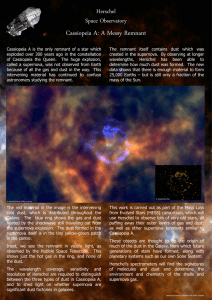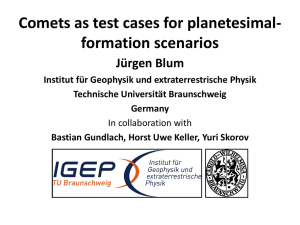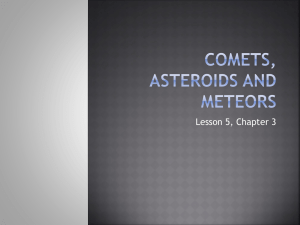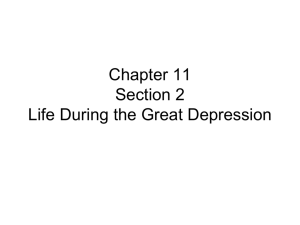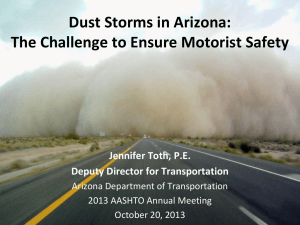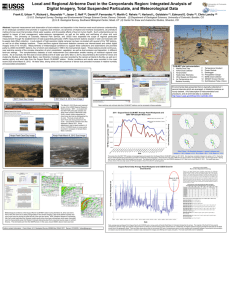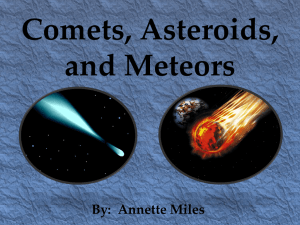Document
advertisement
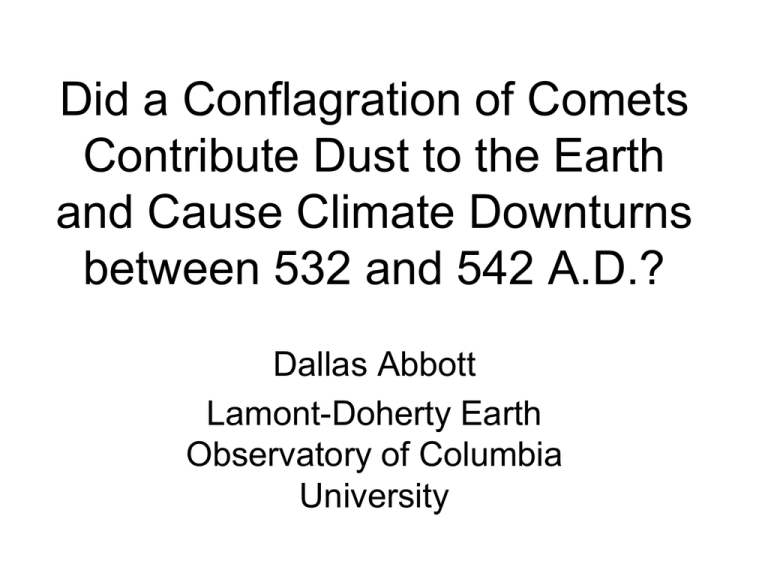
Did a Conflagration of Comets Contribute Dust to the Earth and Cause Climate Downturns between 532 and 542 A.D.? Dallas Abbott Lamont-Doherty Earth Observatory of Columbia University Collaborators • • • • Pierre Biscaye-LDEO Jihong ColeDai-Univ. of S. Dakota Dee Breger-Micrographic Arts Robert Juhl-Tokyo, Japan-Independent Researcher • John Barron-US Geological Survey • Nashaila Porter-summer intern Goals of Talk • 1) Use historical data on dust storms in China and water chemistry to calendar year date the ice core • 2) Use historical data on extraterrestrial inputs to ice core to test calendar year dates. • 3) Make a case for multiple comet strikes to the Earth between 533 and 541 A.D. • 4) Propose locations for the strikes with most abundant and unusual diatoms. Storms of Yellow Dust in China (500-560 A.D.) Yellow Dust from Asia (including China)-Goes to Greenland Insights from Ice Cores Non-seawater sulfate-proxy for volcanism Non-seawater Ca and Mg-proxy for dust from central Asia Composition of ice in Greenland -Can we see the Yellow Dust in Mg non seawater? proxy for dust Dust Storms out of season in China are rare Out of season dust storms 522 A.D.-”since the 8th month, yellow dust has hidden the sun” 535 A.D.-”yellow dust fell like snow” 536 A.D.-”yellow dust fell like snow” 537 A.D.-”rained ashes of a yellow color” (volcanic?) None reported until after 547 A.D. Use dust storms to date GISP2 core 3 year shift-Ca peak is now at 536 A.D. Small sulfate peak at 537 A.D. when Chinese reported possible volcanic dust Time Scale of Greenland Ice cores and volcanic source • Sulfate anomaly too small-should be bigger-should be at height of red star Second Set of Historical DataDancing with the Stars (Dust)? • “And the stars in the sky had appeared dancing in a strange manner and it was the summer of the year 11 (533 A.D.) • And it lasted about six or seven years, until the year three (540 A.D.)” • Attributed to Zacharias of Mytilenelocated on the Greek island of Lesbos. • He lived in Greece and Palestine during his life. Ni-Fe-Cl-C rich dust from ice core ~533 A.D. (532.9-533.7 A.D.) Comet observed from Earth on March 1st, 533 A.D., within this time window. Must have been a close pass-could be comet debris. Importance of Ni • • • • • Earth-most Ni in the core Surface of Earth-typical Ni-parts per million Extraterrestrial-Ni content at % level Ni visible in spectra-at 1% level or higher Likely source-extraterrestrial material Debris from an impact? • Native Ni within dust ~536.8±0.2 AD • Native elements characteristic of impact “large” cosmic debris- quenched cosmic spherule: 534.7 to 535 A.D. –enhanced meteor shower? Cosmic Spherule-Dates to 536.6 to 537.0 A.D. Spherule (right) and native Sn (bright bottom left)-537 to 537.4 A.D.- comet Feb. 537 Cosmic spherule- from 538.8 to 539.5 A.D. time window Chronologies Match with New Time Scale Ni-rich plus Cosmic Spherules- Comet Dust? 45 5 40 4 35 Fossils, # 30 3 25 # Fossils 20 2 15 10 1 5 0 0 532 534 536 538 Year, A. D. 540 542 NI+cosmic Next Set of Historical DataComet Observations Ice core Comet Sightings and Fossils in Ice Core Most fossils in ice core are diatoms-locations of diatom rich sediments Need for shallow water in oceanotherwise impactor too large Benthic Marine Diatom from ice core • Photosynthetic-water depth <100 m Barite and Zircon Crystals from Greenland (GISP2 Ice Core) Continent Shallow Water With Ca data- CaCO3 proxy 536 A.D.-Tropical/Subtropical Microfossils from GISP2 ice core Silicoflagellate in 536 AD layer Marine Silicoflagellate Dictyocha stapedia Haeckel (Dave Bukry) Tropical to subtropical species Summary • 1 event-533 A.D.-a few diatomsextraterrestrial debris-no Ca-high latitude? • 1 event late 535-536 A.D.-tropical diatomsclimate downturn-extraterrestrial debris • 1 event early 537 A.D.-tropical diatoms-still in climate downturn-extraterrestrial debris • 1 event 538 A.D.-high latitude and Eocene diatoms-extraterrestrial debris-no climate downturn • 1 event 541 A.D. –tropical diatoms-no extraterrestrial debris-climate downturn What is Happening-Get Insights from Historical Accounts • 533 A.D. (attributed previously to 536 A.D. but one source says written in 534 A.D.) • Casiodorus-(Roman)-”The sun seems to have lost its wonted light and appears of a bluish color. We marvel to see no shadows of our bodies at noon, to feel the mighty vigor of the sun’s heat wasted into feebleness” 536 A.D. -Climate Downturn • Michael the Syrian: "the sun was dark and its darkness lasted for eighteen months. Each day it shone for about four hours, and still this light was only a feeble shadow ... the fruits did not ripen and the wine tasted like sour grapes." Tree RingsFrost Starting in Early 536 A.D. Damaged tree rings 536-538 A.D. Frost Rings from Bristlecone Pines-500-560 A.D. Ice core Source Area for High Latitude Event-Norwegian Sea? 1500 BP tsunami in Shetland islands-right location for Grendel crater candidate Insights from Legends? • Monster Grendel-interpreted by Mike Baillie as a comet• Other legends-3 years without a summer from Scandinavia• same time as Grendel legend ~6th century Grendel crater candidate (very large though) Another possibility-round bay in Norway-smaller size Summary Ice core samples show evidence of cosmic influences from 533 to 540 A.D. –Ni rich comet pieces-this confirms dating from dust layers. Cosmic material is found just after comet passes Suggests close pass of comet to Earth or Earth orbit (if comet passes plane of Earths orbit will leave material behind that later can hit the Earth) Marine fossil rich layers also found just after comet passes Conclusions The climate downturn of 536-537 A.D. was probably produced by impact and cosmic dust Our dating of core puts sulfate rich layer in 537 A.D. (same time as one of Chinese dust layers). Origin of climate downturn in 541-542 A.D. is less clear-something happened to put marine diatoms into the air but no direct extraterrestrial debris in ice core (could be an explosive underwater volcanic eruption). 541 A.D. has a sulfate rich layer-might be from a volcanic eruption. Examples of chevrons-point to source of tsunami • Chevrons-some are tsunami depositslook redder in close up-those on left visited last summer– are megatsunami deposits-contain marine carbonate What you can do with your students • 1) using Google Earth, look for small chevrons with reddish tint in close up next to the ocean at low latitudes • 2) should be well preserved • 3) will probably only be a single or a few chevrons-these are small impacts • 4) send me a jpg and a latitude and longitude

